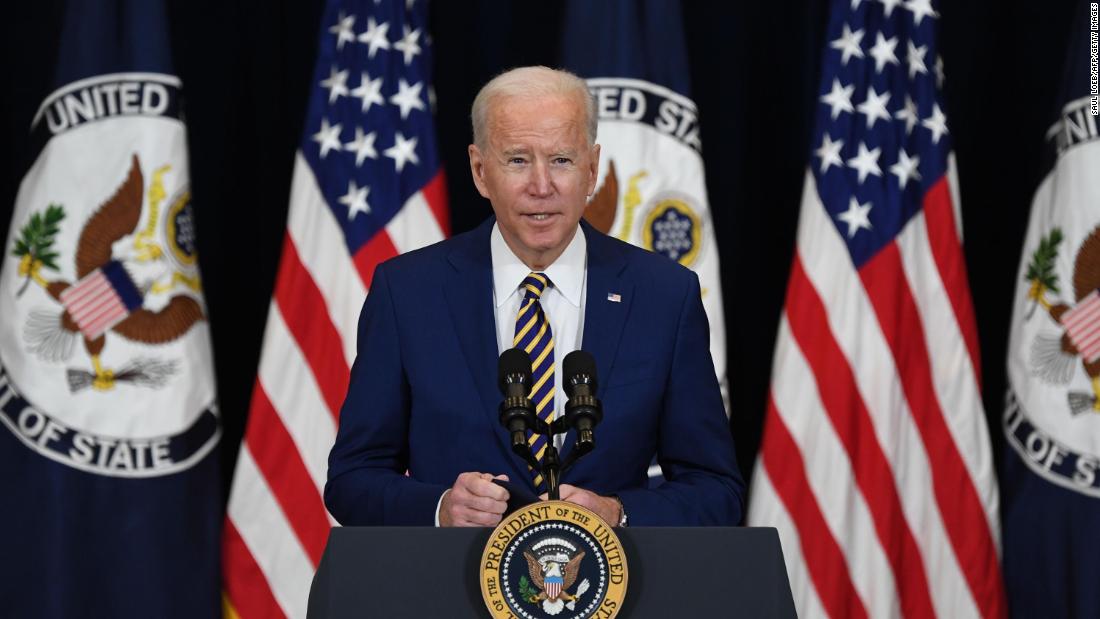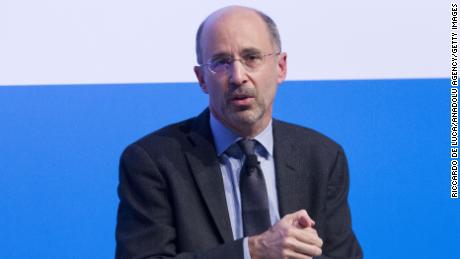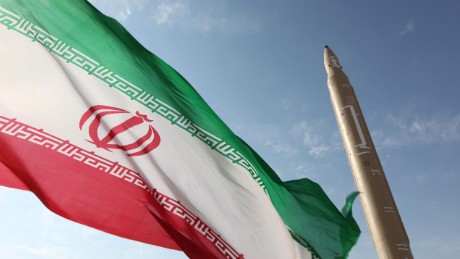Biden stays silent on Iran as his team works to break nuclear impasse
In a striking counterpoint to Biden’s public silence on Tehran, his administration has launched intense behind-the-scenes efforts, reflecting an urgency that administration officials say is needed to address the country’s nuclear program, missiles and regional activity, and to resolve the question of how and whether to rejoin the Iran nuclear deal.
The flurry of quiet activity — alongside Biden’s restraint — underscores the sea change in tactics between this administration and the Trump White House on issues across the board, but particularly when it comes to sensitive diplomatic endeavors. Gone are the provocative tweets and threats, decisions made without allies and outside the deliberative interagency process, a contrast that White House spokeswoman Jen Psaki pointedly highlighted Friday.
“The meeting today is part of an ongoing policy review,” Psaki tweeted about the National Security Council’s Principals Committee discussions, and “proof that the interagency process is back to functioning after four long years of personality-driven decision-making.”
Battle lines drawn
There is broad agreement that while President Donald Trump built some leverage through his maximum pressure campaign on Iran, he failed to use it effectively. Tehran has continued its regional interference, and has steadily increased its violations of the nuclear deal and support for terrorism.
Now, with Biden’s newly formed Iran team just beginning its work, it is trying to reach consensus about how the US should approach a return to the nuclear deal, a senior administration official told CNN. Already, the first set of diplomatic battle lines has been drawn, both countries are jockeying for position, US lawmakers are advocating for and against, and other actors are trying to create momentum.
The first battle is over the first step.
Biden has said the US will rejoin the nuclear deal once Tehran fully complies with the pact again. Iran has responded that because the US left the agreement in 2018, Washington should make the first move by removing the crippling sanctions Trump liberally imposed on Iran’s leaders, on individuals and the economy, and for terrorism.
“The United States needs to come back into compliance and Iran will be ready immediately to respond,” Zarif said.
Tehran’s Parliament has ratcheted up the pressure, passing legislation on December 2 that requires significant increases in its nuclear activities at regular intervals if Iran’s demands for sanctions relief, including on its banking and oil sectors, are not met.
Tehran announced in January that it had resumed enriching uranium up to 20% purity at its Fordow facility. Nuclear officials last week increased enrichment capacity at the Natanz facility. And on Monday, Iran aired video footage of what it claimed was the “most powerful” rocket engine using a system that could launch long-range missiles capable of endangering US allies in Europe and the Middle East or the US itself.
Two US defense officials told CNN the US assesses that Iranian leaders were not trying to be provocative but rather signaling they will continue pursuing a nuclear weapons program unless the US first lifts sanctions. Regional experts say that’s the point of Iran’s nuclear steps as well.
“Really the goal of this is to put pressure on the United States to return to the JCPOA. That’s kind of the overarching political objective,” said Eric Brewer, deputy director and senior fellow with the Project on Nuclear Issues at the Center for Strategic and International Studies.
For its part, the Biden team is betting that Iran wants the deal more desperately than it does.
Biden administration officials have repeatedly said they will take their time. Psaki said Friday that renewing the JCPOA is “really up to Iran” and its return to full compliance.
Just the start
State Department spokesman Ned Price, asked if the administration was thinking of sending Iran a signal or goodwill gesture, said the Biden team’s “first focus is on engagement, partnership discussions with our allies, partners and members of Congress.”
If the US does rejoin the JCPOA, Price said, it would be just the start. The US would “use that as a platform for follow-on agreements that would take on other areas of concern … ballistic missiles, support for proxies, a number of other issues are included in that,” he said.
Senior officials are sending what might be good cop-bad cop signals, some cautioning that a deal will take time, others suggesting engagement is urgently needed. One administration official told CNN there is growing concern that Iran’s nuclear enrichment activities have made the potential for a renewed nuclear deal all but impossible.
Publicly, Blinken has said the US is “a long way” from reaching “a longer and stronger” deal with Iran — calling for it to first return to full compliance — while national security adviser Jake Sullivan said January 29 that “a critical early priority has to be to deal with what is an escalating nuclear crisis” as Iran moves closer to having enough fissile material for a weapon.
During an event at the US Institute of Peace, Sullivan noted that after four years, Iran is “significantly closer to a nuclear weapon than they were when the previous administration withdrew from the JCPOA,” that “their ballistic missile capability has also advanced dramatically” and “their recklessness and sponsorship of terrorism in the region has not abated and in some areas has accelerated as well.”
Sen. Jeanne Shaheen, a New Hampshire Democrat on the Senate Foreign Relations Committee, said the increased dangers Sullivan outlined are “precisely what military leaders, diplomats, lawmakers of both parties and our nation’s closest allies warned President Trump would happen if he abandoned the Iran nuclear agreement. The new administration is tasked with mitigating the damage caused by Donald Trump, and I believe President Biden and Secretary Blinken are doing what is needed to reengage with our international partners and constrain Iran’s nuclear activity.”
But James Jeffrey, who served as the Trump administration’s special representative for Syria engagement, warned that “finding an agreement quickly on the JCPOA will not be as easy as it sounds.”
“The Iranians are pressing for things that are unacceptable to us, including the United States’ return to compliance first,” said Jeffrey, who’s now chair of the Wilson Center’s Middle East program, in a call with reporters. For its part, the US also wants to discuss missiles “and particularly the Iranian presence and activities in the region. … Iran does not want to discuss these things and has made that clear.”
Biden’s omission of Iran, Jeffrey thinks, is due to “some concern that if the Iranians think we really want this agreement more than they do” they will use the non-nuclear issues — including their missile program, regional activities and support for terrorism — “to dial up or dial down” pressure on the US and “squeeze more out of us.” Removing sanctions too quickly will deprive Biden of the best leverage the US has, Jeffrey said.
Bumpy ride
Trita Parsi, executive vice president of the Quincy Institute for Responsible Statecraft, was more optimistic: “I have a hard time seeing them not resolving this, for the simple reason that it aligns so squarely with both their interests to go back into the JCPOA, but it doesn’t mean that it won’t be a bumpy ride and these are some of the bumps.”
The back-and-forth underway between Iran and the US “is all about saving face,” said Alex Vatanka, Iran program director at the Middle East Institute. “Iran wants to negotiate; the Americans want to negotiate.” Iran’s fragile economy offers the US some leverage, he said. “Both sides know if they start tough negotiations about Iran’s missiles there are big questions that will take months, if not years, to negotiate. In the meantime, the Iranian economy is in the tank.”
Zarif, who also faces the prospect that June elections might end his tenure as foreign minister, has suggested that European Union foreign policy chief Joseph Borrell could “sort of choreograph the actions that are needed to be taken by the United States and the actions that are needed to be taken by Iran.”
And French President Emmanuel Macron has made clear he would like the job, saying he would do “whatever I can to support any initiative from the US side to reengage in a demanding dialogue.” Speaking during an online forum sponsored by the Atlantic Council think tank, Macron said he would “try to be an honest broker. … We do need to finalize a new negotiation with Iran and President Biden has a critical role.”
CNN’s Barbara Starr and Vivian Salama contributed to this report.
![]()






